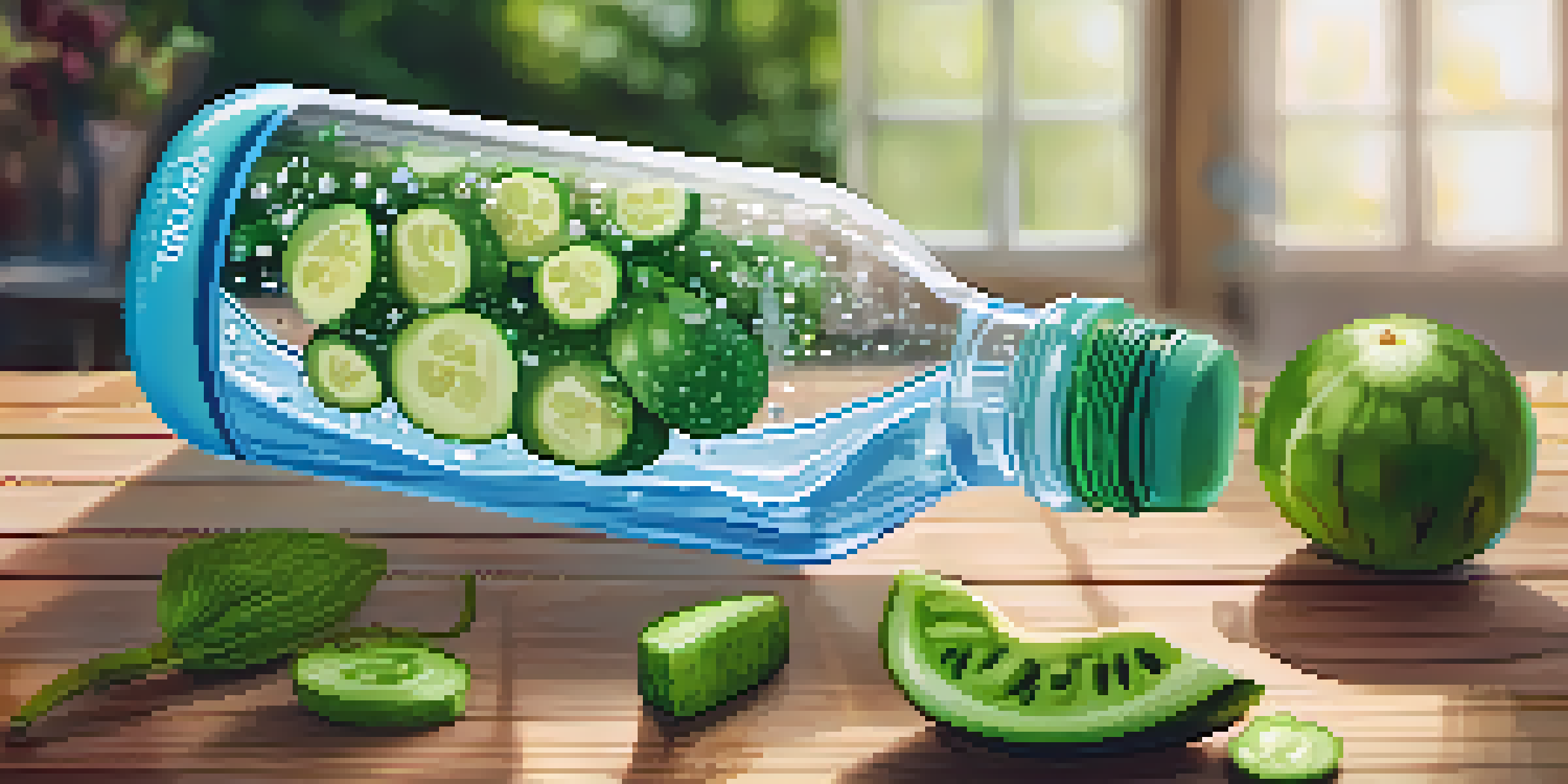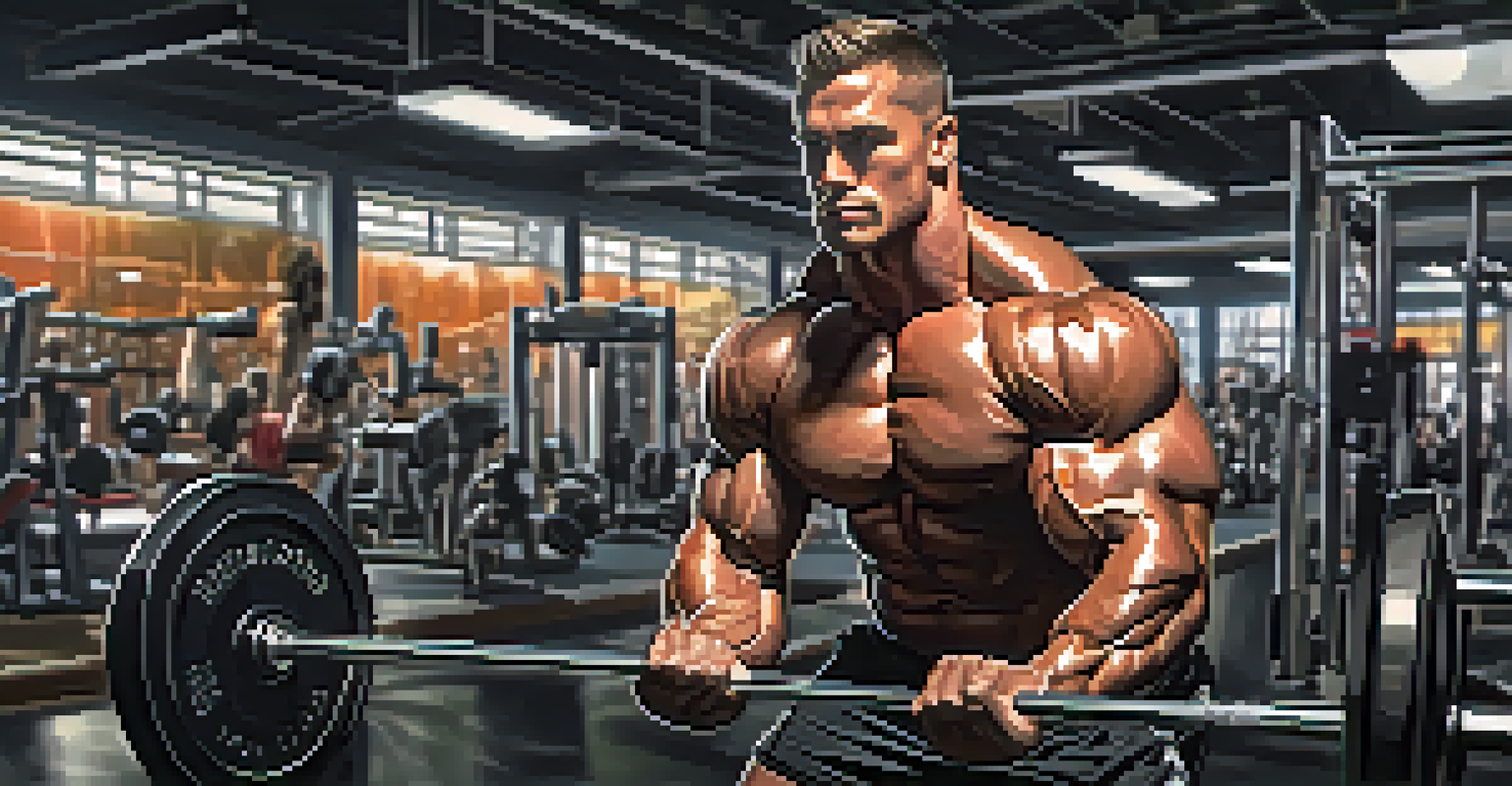The Importance of Hydration in Bodybuilding Injury Prevention

Understanding Hydration's Role in Body Function
Hydration is crucial for maintaining various bodily functions, especially during intense workouts. Water helps regulate body temperature, lubricates joints, and transports nutrients to cells. When you're dehydrated, your body's efficiency diminishes, making it harder to perform at your best in the gym.
Water is the source of life, and it is essential for every function of the body.
Imagine trying to drive a car without oil; it just wouldn't run smoothly. Similarly, your muscles need adequate hydration to function optimally. Dehydration can lead to muscle cramps, fatigue, and impaired recovery, all of which increase the risk of injury.
In bodybuilding, where every rep counts, ensuring proper hydration is a non-negotiable part of your routine. Keeping your body well-hydrated means you can push harder, recover faster, and stay injury-free.
The Connection Between Hydration and Muscle Performance
Muscles are primarily made up of water, so staying hydrated is vital for their performance. When you lift weights, your muscles contract and require water to facilitate this process. Without enough fluids, muscle contractions become less efficient, and fatigue sets in more quickly.

Think of hydration as the oil in a well-tuned machine; it keeps everything running smoothly. Dehydrated muscles can lead to reduced strength, which not only hampers your workout but also increases the likelihood of injuries, such as strains or sprains.
Hydration Boosts Workout Performance
Staying well-hydrated enhances muscle function, reduces fatigue, and minimizes injury risk during workouts.
Consistently drinking water before, during, and after workouts ensures that your muscles remain hydrated and ready to perform. This proactive approach to hydration can lead to better gains and reduced injury risk over time.
How Dehydration Affects Joint Health
Joint health is another critical aspect of bodybuilding that hydration directly impacts. Water acts as a lubricant for your joints, allowing for smoother movements and reducing friction. When dehydrated, this lubrication decreases, leading to discomfort and increasing the chances of joint injuries.
Hydration is not just a matter of thirst; it's a matter of performance.
Consider your joints as hinges on a door; they need lubrication to function properly. If the hinges are rusty and dry, the door won't open smoothly. Similarly, without enough water, your joints may feel stiff and painful during workouts.
By staying hydrated, you help maintain optimal joint function, enabling you to perform exercises with better form. This not only enhances your overall performance but also protects you from potential injuries associated with poor joint lubrication.
Signs of Dehydration to Watch For
Recognizing the signs of dehydration is essential for preventing injury. Common symptoms include dry mouth, fatigue, dizziness, and dark-colored urine. If you experience any of these signs, it's a clear indication that your body needs more fluids.
Imagine trying to run a marathon without proper training; it would be a struggle. Similarly, ignoring dehydration can lead to performance setbacks and increase your risk of injuries. Being aware of these signs can help you take action before it's too late.
Joint Health Depends on Hydration
Proper hydration lubricates joints, ensuring smoother movements and reducing the likelihood of joint injuries.
Make it a habit to check in with your body throughout the day, especially during workouts. Staying proactive about hydration not only boosts your performance but also helps you avoid the pitfalls of dehydration-related injuries.
Best Practices for Staying Hydrated
Staying hydrated doesn't have to be complicated. A good rule of thumb is to drink water consistently throughout the day, not just during workouts. Aim for at least half your body weight in ounces of water daily, adjusting for activity level and climate.
Consider carrying a water bottle with you as a reminder to drink regularly. You can even set timers on your phone to prompt you to take a sip every hour. This simple practice can make a big difference in your overall hydration levels.
Additionally, consuming foods with high water content, like fruits and vegetables, can complement your hydration efforts. Combining these practices creates a well-rounded approach to staying hydrated and injury-free.
The Role of Electrolytes in Hydration
While water is essential for hydration, electrolytes play a crucial role in maintaining fluid balance within the body. Electrolytes, such as sodium, potassium, and magnesium, help regulate muscle contractions and nerve function. Without them, hydration alone may not be effective.
Think of electrolytes as the supporting cast in a movie; they may not get the main spotlight, but they are vital for the story to unfold smoothly. During intense workouts, you may lose electrolytes through sweat, making it important to replenish them.
Recognize Dehydration Signs Early
Being aware of dehydration symptoms like dry mouth and fatigue helps prevent performance setbacks and injuries.
Incorporating electrolyte-rich drinks or foods into your routine can enhance your hydration strategy. This ensures that your body has the necessary balance to function optimally, thereby reducing the risk of injury during your bodybuilding journey.
Hydration Strategies for Bodybuilders
Creating a personalized hydration strategy can be a game-changer for bodybuilders. Start by assessing your daily routine and determining when you tend to sweat the most. This will help you figure out when to prioritize hydration, especially during training sessions.
Consider using hydration apps or journals to track your water intake and remind yourself to drink. This approach can help you stay consistent and make hydration a non-negotiable part of your regimen.

Don't forget to adjust your hydration strategy based on factors like workout intensity and climate. By being mindful of your hydration needs, you can significantly reduce the risk of injuries while maximizing your bodybuilding results.